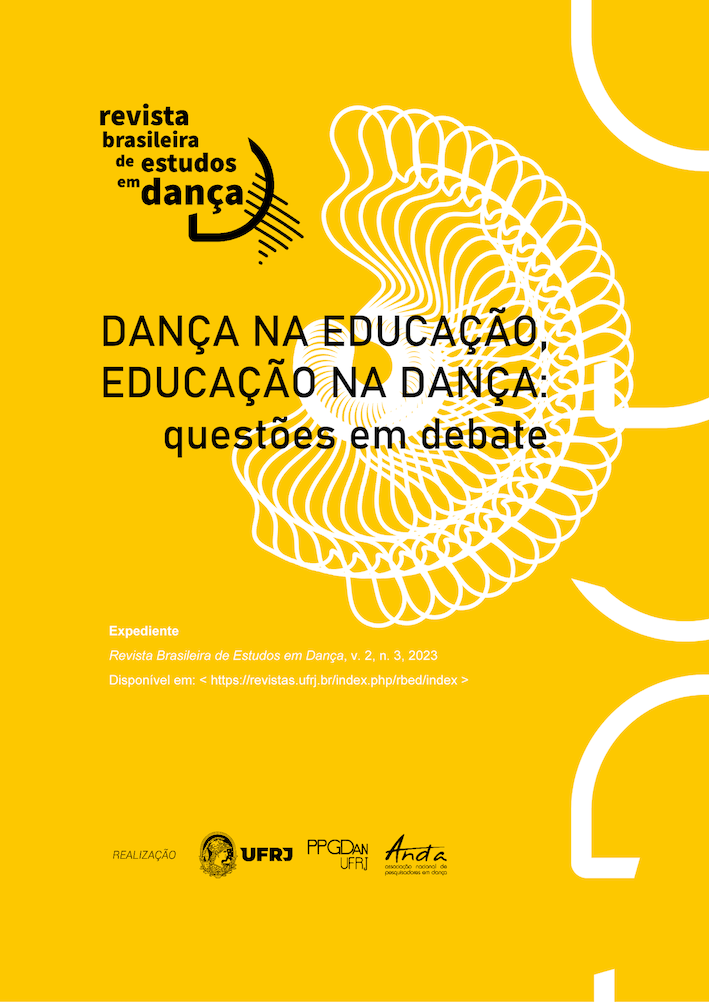Propositions between dance teaching and social movement theoriesTHEORIE
DOI:
https://doi.org/10.58786/rbed.2023.v1.n3.53697Keywords:
Dança/Educação, Processos de ensino-aprendizagem em Dança, Ensino da Dança e Movimentos Sociais.Abstract
This dancing/educational study aims to bring together Social Movement theories and dance teaching-learning processes. The assay brings recent reflections that we are developing in dialogue with autobiographical experiences, self-narratives that articulate experiences as a student and artist/educator. In this way, we organized the writing into two sequences of movements that were named as: (1) Historical Perspectives of the Methodologies for Teaching Dance and (2) Tensions of the teaching-learning processes in Dance with the Theories of Social Movements and Education. In this process, we observe the potentialization of the political dimension of Dance, that reaffirms the need to highlight their social commitment and revisit their practices critically
Downloads
References
ARROYO, Miguel G. Currículo, território em disputa. - 5ª ed. - Petrópolis, RJ: Vozes, 2013.
BARBOZZA, Alexsander; DAMASCENO, Letícia. O Ensino de Dança Empirista no Brasil, Revista Investigaciones en danza y movimiento: Departamento de Artes do Movimento da Universidade Nacional de Artes (Buenos Aires, Argentina). vol 3. nº 6, 2022. Disponível em: https://revistasojs.una.edu.ar/index.php/IDyM/issue/view/IDyM%20-%20Investigaciones%20en%20Danza%20y%20Movimiento>. Acessado: 14 set. de 2022.
BARBOZZA, Alexsander; AQUINO, Rita Ferreira de. História do Ensino da Dança escolar do Rio de Janeiro: Mostra Estudantil de Dança - 1982, no prelo.
BARBOZZA, Alexsander; AQUINO, Rita Ferreira de. Ensino da Dança hoje: em qual realidade nos encontramos?. (Anais) 8º Encontro de Pesquisas Educacionais de Pernambuco (EpePE), Recife: 2021. Disponível em:<https://www.editorarealize.com.br/index.php/artigo/visualizar/83415> . Acessado: 14 set. de 2022.
BORRILO, Daniel. Homofobia: história e crítica de um preconceito. Trad. Guilherme João de Freitas Teixeira. 1ª ed; 3reimp. - Belo Horizonte: Autêntica Editora, 2016. - (Ensaio Geral, 1).
FOUCAULT, Michel. A sociedade punitiva: curso no Collège de France (1972-1973). Trad. Ivone C. Benedetti. - São Paulo: Editora WMF Martins Fontes, 2015. (Coleção obras de Michel Foucault).
GEHRES, Adriana F. Corpo-Dança-Educação: na contemporaneidade ou da construção de corpos fractais. Instituto Piaget: Lisboa, 2008.
hooks, bell. Ensinando a transgredir: a educação como prática da liberdade. Trad. Marcelo Brandão Cipolla. - 2ª ed. - São Paulo: Editora WMF Martins Fontes, 2017.
hooks, bell. Erguer a voz: pensar como feminista, pensar como negra. Trad. Cátia Bocaiuva Maringolo. São Paulo: Elefante, 2019a.
hooks, bell. Anseios: raça, gênero e políticas culturais. Trad. Jamille Pinheiro. São Paulo: Elefante, 2019b.
GOHN, Maria da Glória. Movimentos sociais na contemporaneidade. Revista Brasileira de Educação - Rio de Janeiro - v. 16, n 47, 2011. Disponível em: <https://www.scielo.br/j/rbedu/a/vXJKXcs7cybL3YNbDCkCRVp/?format=pdf&lang=pt>. Acessado: 14 set. de 2022.
GOHN, Maria da Glória. Movimentos Sociais e Educação. 8ª ed. - São Paulo: Cortez. (Coleção questões de nossa época; v 37), 2012.
JOHNSON, Don. O corpo. Trad. de Adauri Bastos; revisão técnica de Gerry Maretzki. - Rio de Janeiro: Nova Fronteira, 1990.
KILOMBA, Grada. Memórias de Plantação: episódios de racismo cotidiano. Trad. Jess Oliveira. 1ª ed. Rio de Janeiro: Cobogó, 2019.
MARQUES, Isabel A. Corpo, dança e educação contemporânea. Revista Pro-posições São Paulo. v. 9. nº 2, 1998. Disponível em: <https://www.fe.unicamp.br/pf-fe/publicacao/1974/26-artigos-marquesia.pdf>. Acessado: 04. jun de 2022.
MARQUES, Isabel A. Ensino de Dança Hoje: textos e contextos. - São Paulo: Cortez, 1999.
MARQUES, Isabel A. Aprender a dançar versus copiar, 2000.
MARQUES, Isabel A. Metodologia para o Ensino de Dança: luxo ou necessidade? In: PEREIRA, Roberto & SOTER, Silvia. (org.) Lições de Dança 4. Rio de Janeiro: UniverCidade, 2003.
MARQUES, Isabel A. De tripé em tripé: o caleidoscópio do Ensino de Dança. In: BARBOSA, Ana Mae; CUNHA, Fernanda Pereira da (Org.). Abordagem Triangular no Ensino das Artes e Culturas Visuais. 1ª ed. São Paulo: Cortez, 2010.
MARQUES, Isabel A. Notas sobre o corpo e o Ensino da Dança. Cadernos Pedagógicos: Lajedo. v. 8, n. 1, 2011. Disponível em:<http://www.univates.br/revistas/index.php/cadped/article/view/827>. Acessado: 04. jun. de 2022.
MARQUES, Isabel A. Interações: Criança, Dança e Escola. São Paulo: Blucher - (Coleção InterAções), 2012.
MARQUES, Isabel A. Arte em questões. - 2ª ed. - São Paulo: Cortez, 2014.
MBEMBE, Achille. Necropolítica: biopoder, soberania, estado de exceção, política da morte. Tradução de Renata Santini. São Paulo: N-1 edições, 2018. 80 p.
RIBAS, Alberto. Importância da Dança na Educação. In: MIRANDA, Orlando (Org.). Coletânea do Jornal de Arte e Educação. Capa: Ziraldo. - Rio de Janeiro: Teatral, 2009.
SILVA, Tomaz Tadeu da (Org.). Identidade e Diferença: a perspectiva dos Estudos Culturais. Stuart Hall, Kathryn Woodward. 15. ed. - Petrópolis, Rio de Janeiro, 2014.
SOUZA, Ana. Paula. Abrahamian. de. Corpos que dançam dentro e fora da escola: discursos pela interculturalidade na dança no ensino. Dissertação (Mestrado em Educação), Centro de Educação da Universidade Federal de Pernambuco (CE/UFPE). 2010. Disponível em: <https://repositorio.ufpe.br/handle/123456789/4154>. Acessado: 04. jun de 2022.
Downloads
Published
Versions
- 2024-05-09 (3)
- 2023-12-01 (2)
- 2023-09-02 (1)
How to Cite
Issue
Section
License
Authors who publish in the Revista Brasileira de Estudos em Dança are
responsible for the content of signed articles and retain copyright.
They grant the journal the right of first publication with the work simultaneously
licensed under the Creative Commons Attribution-NonCommercial 4.0 License
(Open Archives Initiative - OAI). This feature, used for open-access journals,
allows sharing work for non-commercial purposes and acknowledges
authorship. If the text is later published in another vehicle, the author
must inform that it was initially published as an article in the Revista Brasileira
de Estudos em Dança. Therefore, even if the journal owns the first publication,
authors are entitled to publish their work in institutional repositories or on
their personal pages, even if the editorial process has not been completed.
The journal reserves the right to make normative, orthographic, and grammatical changes to maintain the language standard, respecting the authorial style.

